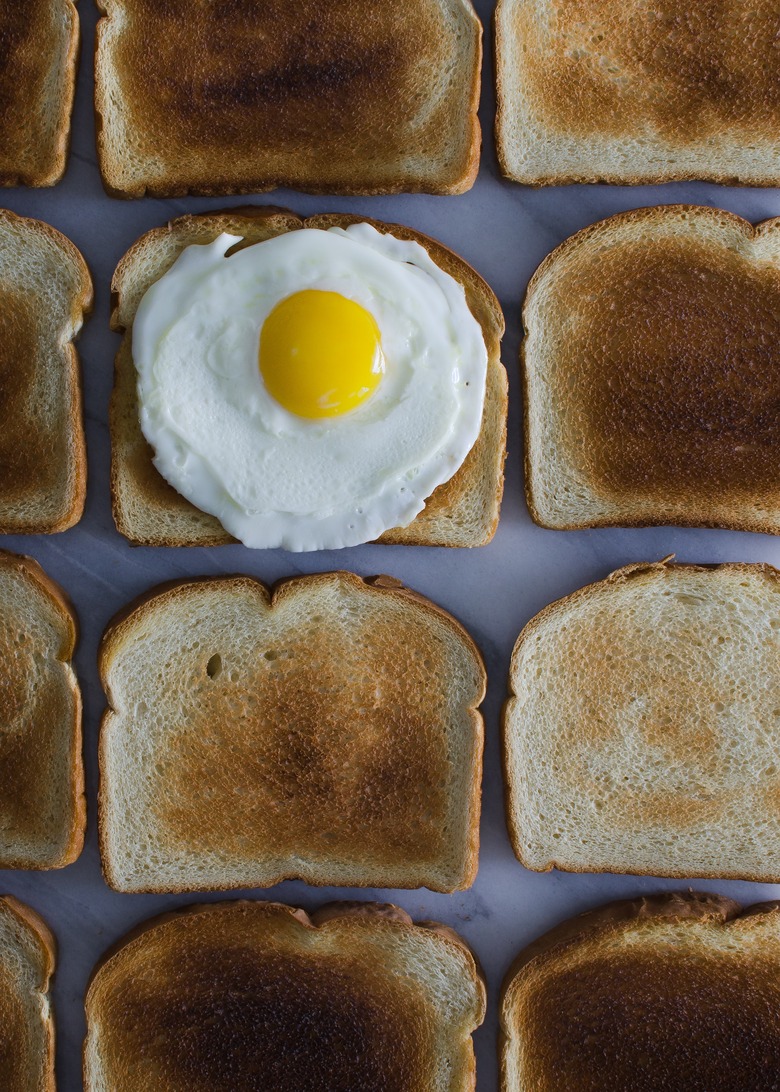Egg Whites Aren't Any Healthier Than Whole Eggs
I bet you've noticed that the "healthier" egg white omelet on an otherwise decadent brunch menu is far less satisfying. I bet you're tired of shying away from yolk-heavy breakfasts, like eggs Benedict or eggs sunny side up, just because you're sticking to some diet.
But why refrain from those delicious plates? The truth is sticking solely to egg whites isn't doing your health any favors. The egg white craze needs to come to an end.
The whites have been hailed as a dietary solution for "problems" like calories, fats, and cholesterol found in the yolks.
It's true that egg whites have fewer calories than the whole egg — clearly, since you're removing a huge piece of the egg. But time and time again, nutritionists and researchers alike have found that a lower calorie count isn't what you should aim for, and that instead it's the nutritional value in your calories that count.
It's true that egg yolks contain fats — about 3.5 grams each. Not only is that amount relatively small (equivalent to about a tenth of the fat in an avocado), but fats are necessary for good health and can result in decreased risk of heart disease, increased brain health, and even weight loss. Additionally, consumption of healthy fats has been linked to an increase in good cholesterol and a decrease in bad cholesterol. If it's really your cholesterol you're worried about, eating whole eggs could actually help.
And speaking of cholesterol: It's true that egg yolks contain a fair amount of cholesterol. However, (and you knew this was coming) our fear of consuming the cholesterol found in eggs is entirely unfounded. To confirm this, we spoke to an experienced researcher and an expert on muscle health, Neerav D. Padliya, Ph. D., vice president of research alliances at Qurr, a company that markets an egg yolk-based muscle building supplement.
"Many people avoided egg yolk due to concerns relating to the impact of consuming egg yolk on serum cholesterol," he explained. Serum cholesterol has been associated with heart disease — resulting in many adults becoming increasingly careful about their cholesterol intake and deconstructing eggs.
"However," says Dr. Padliya, "according to research published by Dr. Frank Hu, Harvard University, consuming one egg per day was not found to have any substantial overall impact on the risk of coronary heart disease or stroke among healthy men and women."
So your one to two eggs per day could be entirely benign, cholesterol-wise. If you are at risk for high cholesterol, just don't go too crazy on the eggs. But who's really eating more than two eggs at a time, anyway?
Sticking to the whole egg isn't only harmless, but it's actually wildly beneficial nutritionally.
If it's protein you're after, the yolk has some, too. By default, if you cut out the yolk, you cut out some protein. End of story.
The yolk of the egg is also a nutritional goldmine, especially when it comes to vitamins and minerals. If you skip the yolk, you're missing out on significant amounts of minerals like iron, phosphorus, zinc, folate, selenium, and choline. You're also missing the important vitamins D and A. And you're missing lutein and zeaxanthin — two carotenoids that, according to Dr. Padliya, "can help prevent age-related macular degeneration, one of the leading causes of blindness in the Western world."
They're good for your heart, good for your eyes, and good for your taste buds. What are we doing with our egg white omelets and our tedious baking substitutions? We're cheating ourselves of nutritional benefit, tons of taste, and the endlessly satisfying feeling of breaking open a runny yolk.
